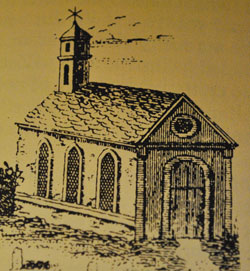
There were certain rites of passage marked by colonial churches—birth, initiation, marriage, and death for the great majority of its white population and to lesser and varying extents for non-adherents and African Americans as well. We will look at the second one this week – Initiation of confirmation.
Last week we looked at Baptism. Baptism brought Church membership but was only an introduction into the church. Initiation and confirmation was the next step. Technically the child had to memorize the Apostle’s creed, the Lord’s Prayer and the Ten Commandments. (See tablet below) There was less specific requirement – attendance at church and training in virtuous habits.
Since there was not a system of public schooling in colonial Virginia, the family was the key unit in education and in particular the parents. Since the family was also the entity pushing confirmation, there was a blurring of the lines of secular and religious education. It was all part of one process. The backup was the godparents. Promises made on behalf of the bap¬tized infant obligated godparents to see that the child was nurtured and brought to a mature understanding of the faith
Parents passed on the knowledge and skills they had acquired and which seemed appropriate to their station in life. Part and parcel of this process would be the "do’s and don’ts" of conduct, moral precepts, and traditional stories, verse, and songs, including those biblical in their source. Whether regular Bible reading and family prayers were a fea¬ture in a few, some, or many Old Dominion households is unknown
Other than parent teaching their children, there were local Anglican parson that did teach in private schools which tended to meet the affordability of those with more modest mean. Wealthy families employed their own teachers.
Confirmation was the ritual means — a veritable "rite" of passage—by which the Church of England marked the assumption of adult religious re¬sponsibilities. The Bishop confirmed in England but since there was no Bishop in Colonial America there was a problem with confirmation
Presumably ministers modified or dropped the final exhortation to godparents in the baptism service whereby they were charged to bring the child to the bishop for confirmation when they were satisfied that the child had been sufficiently instructed in the essen¬tials of the faith

(tablets required by the 1606 canons and the basic catechism for those seeking initiation)
Despite the fact there wasn’t a bishop that confirmed children, they still took communion. The Prayer Book rubric provided an escape clause; communion might be administered to those "ready and desirous to be confirmed." Again, what is not known is whether Virginia parsons adopted measures to satisfy themselves that communicants not only desired to be confirmed but could repeat the Creed, the Lord’s Prayer, and the Ten Commandments and make the approved responses to the catechetical questions.
While few colonial Virginians were actually confirmed, they realized the the purposes of confirmation but unfortunately without benefit of the rite.
